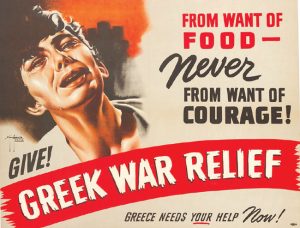How the Greek-Americans helped German-occupied Greece
Posted by estiator at 11 September, at 09 : 35 AM Print
The magnificent story of the mobilization to save thousands from starvation and disease
■ By professor ALEXANDROS K. ΚYROU
After the occupation of Greece by the Germans and long before the entry of the United States in the Second World War, the Greek people faced starvation and thousands died, mainly in Athens. It did not take long for the Greek-Americans to mobilize in an unprecedented patriotic effort with the Greek War Relief, in order to send food and medicine to their suffering motherland. Following is the story of this wonderful campaign, a great work of professor Alexandros K. Kyrou, under the title “Operation Blockade: Greek-American Humanitarianism During World War II.” It is included in a new book titled “Greece’s Pivotal Role in World and its Importance to the U.S. Today,” edited by Eugene Rossidis, Esq., founder of the American Hellenic Institute, with a preface by Gen. Andrew J. Godpaster.
The Greek-American response to the wartime tragedy of the 1940s in Greece reflected the enduring and strong identification of the diaspora with the welfare and plight of the Greek nation. The Greek-American community was not unique insofar as it, like other ethnic groups in the United States, demonstrated an ardent interest in the events which affected its homeland, but the extent to which Greek-Americans turned their concern into public activism and successful lobbying of government was arguably without rival during the Second World War. Indeed, this largely ignored episode in wartime history is rich in potential lessons for today’s policy-makers concerned with the formulation and implementation of global humanitarian relief.
The story of diaspora humanitarian intervention offers an example of cooperation among a non-government actor (the Greek War Relief Association), a transnational organization (the International Red Cross), and national actors (the Allies, Axis, and neutral powers). Moreover, the decisive impact of the Greek-American relief campaign points to the importance of diaspora groups in influencing the strategic calculus of Great Powers whose support for humanitarian assistance is interpreted against realpolitik considerations. This study will explore Greek-American efforts to intercede in the international environment as a non-political actor on behalf of humanitarian imperatives in Greece during the Axis occupation of that country. The study will conclude with some summary observations regarding the Greek War Relief Association’s impact on larger patterns of humanitarian aid and rehabilitation in postwar Europe.

The same day that Mussolini launched his abortive invasion of Greece in late October 1940. the Creek-language press in the United States called upon Greek-Americans to rise to the support of the homeland. Responding quickly, Creek communities throughout the United States met to organize local efforts to deliver aid to Greece. It soon became apparent, however, that a national structure would be necessary to coordinate any large-scale relief campaign. Accordingly, and in response to a call by Archbishop Athenagoras, the head of the Greek Orthodox Archdiocese of North and South America, hundreds of representatives from Greek communities and voluntary associations convened in New York on November 7. Guided by Athenagoras proposals, the representatives agreed to merge their efforts under one Pan-Hellenic and Pan-American organization to be known as the Greek War Relief Association, or GWRA. The representatives established the basis for the executive administration of the new organization, elected the influential business leader. Spyros Skouras, as national chairman, and resolved to adopt a policy of political non-partisanship.
Two days following the New York meeting, the newly incorporated GWRA was officially licensed by the United States Department of State to raise funds for the relief of Greece. Immediately, the national organization and communication networks developed earlier by the Greek Orthodox Archdiocese, major voluntary organizations such as the American Hellenic Educational Progressive Association (AHEPA) and the Greek-American Progressive Association (GAPA), as well as other bodies were mobilized to aid the GWRA. To enhance its image, the GWRA included many prominent Americans of diverse ethnic backgrounds on its staff and in its fund-raising campaigns. The association’s Greek-American leadership made a deliberate decision to attract respected public personalities outside the Greek-American community to its ranks in order to secure greater public recognition and support for the organization. The measure proved productive, bringing notable philanthropists, academics, and popular performers into the GWRA who, in turn, lent their popularity and influence to the furtherance of the organization—thereby giving the relief effort broader American, not exclusively Greek-American, visibility and appeal.
Concurrent with its administrative development, grassroots support for the GWRA rapidly gathered momentum in the Greek communities throughout the United States. Indicative of both the scope and the intensity of the diaspora mobilization, by November 15 over 350 Greek Orthodox parish communities and over 2,000 voluntary associations had joined the GWRA. Within a few months of its founding, the GWRA had organized some 964 local chapters. More importantly, in the five-month period between the Italian attack and the subsequent German invasion of Greece in April 1941, the GWRA dispatched vital aid to Athens. By mid-November the GWRA’s executive committee in New York had established a central committee in Athens, led in part by the United States ambassador to Greece, Lincoln MacVeagh, to administer services and distribute aid in Greece. Prior 10 the German occupation of Athens, the GWRA had cabled approximately $3,800,000 to its representatives in Greece. These funds were used for a range of philanthropic assistance channeled carefully to civilians; such aid included food, healing fuel, clothing, and medical attention. The GWRA central committee continued to distribute aid until the last possible moments before the occupation of Athens.
Contrary to universal expectations of an easy and rapid Italian victory. Greece’s numerically and materially disadvantaged forces thwarted the Italian invasion by mid-November 1940. That same month the Greek army launched a successful counteroffensive that pushed the retreating Italians deep into Albania. Forced by this humiliating military reversal to rescue Mussolini from Rome’s widening fiasco in the Balkans. Hitler invaded Greece and Yugoslavia on April 6. 1941. Overwhelmed finally by the sheer numbers and mobility of the combined Axis armies. Greece was overrun and occupied by German, Italian, and Bulgarian forces. In response to the Axis occupation, Britain sealed off all shipping lanes into Greece. The blockade was intended to deny the Axis any channels for supply and movement. However, its implementation would soon lead to famine.
 Greece was a net importer of wheal and relied on foreign markets for more than one-third of its food needs. More precisely, with an average prewar annual wheat crop of approximately 700.000 tons, and a 1.200.000 tons wheat consumption level, Greece was forced to import yearly 500.00 tons of wheat. The Axis occupation and the subsequent British blockade interrupted the normal means of securing foodstuffs vital to Greece’s subsistence. The situation was worsened by the anemic grain harvest of 1941, which produced roughly 200.000 tons less than the prewar average. The Axis expropriation of food stocks intensified the crisis, and the division of the country into Bulgarian, German, and Italian occupation zones disrupted the prewar systems of supply and distribution. Finally, the flow of refugees into urban centers, especially the Athens-Piraeus area, strained already acutely diminished resources to the breaking point.
Greece was a net importer of wheal and relied on foreign markets for more than one-third of its food needs. More precisely, with an average prewar annual wheat crop of approximately 700.000 tons, and a 1.200.000 tons wheat consumption level, Greece was forced to import yearly 500.00 tons of wheat. The Axis occupation and the subsequent British blockade interrupted the normal means of securing foodstuffs vital to Greece’s subsistence. The situation was worsened by the anemic grain harvest of 1941, which produced roughly 200.000 tons less than the prewar average. The Axis expropriation of food stocks intensified the crisis, and the division of the country into Bulgarian, German, and Italian occupation zones disrupted the prewar systems of supply and distribution. Finally, the flow of refugees into urban centers, especially the Athens-Piraeus area, strained already acutely diminished resources to the breaking point.
Reports of starvation in Greece began to appear in the Greek-American press in early July. The obstacle of Axis occupation, rather than discouraging Greek-Americans from pursuing efforts to deliver aid to Greece, underscored the need to provide immediate humanitarian relief to the Greek population. In short, the serious deterioration of conditions in Greece motivated Greek-Americans to seek other means to secure their ongoing and now expanded aid goals.
The Greek-language press led the discussion in the Creek-American community on the widening crisis in Axis-occupied Greece. The press was exceedingly active in advancing the position that Britain’s blockade should and could be adjusted to allow for the delivery and distribution of food to the hapless Greek population. The dominant figure in this press movement was Basil Vlavianos, (he publisher and editor of the influential, liberal Creek-language New York daily newspaper, Ethnikos Keryx (National Herald). Through a multitude of fiery public appearances, as well as countless editorials. Vlavianos called for a change in Britain’s blockade against Axis-occupied Greece. Reflecting the attitude of the vast majority of Creek-Americans, Vlavianos insisted that Greece’s severe food shortage, in combination with the country’s staunch resistance against the Axis, demanded that Allied strategists find some means to re-open the vital shipping lanes lo Greece. Vlavianos implored Britain not only to alter its total blockade policy, but to lend all available support in dispatching food and other humanitarian aid to Greece.
Encouraged by Vlavianos and other community leaders. Greek-Americans throughout the United States began a grassroots lobbying campaign. Through mass telegraphing and letter-writing to their elected representatives in Washington, the Greek-American community labored to influence the United States government into bringing pressure to bear on Britain to alter its blockade policy against Axis-occupied Greece. Pursuant to that goal, and after outlining a relief strategy with the help of Norman Davis, the executive director of the American Red Cross. Spyros Skouras met with representatives of (he Department of State on August 21. 1941. With the backing of Davis and Ambassador MacVeagh, Skouras presented a plan and request to the Department of State’s Division of Near Eastern Affairs for a trial shipment of wheat to Greece. Skouras proposed that the GWRA charter a neutral vessel, load it with wheat in the United States or in some other willing country, and dispatch it to Greece. In order to insure proper distribution of the intended cargo, the GWRA would send a representative oversight group to accompany the relief materials. If the proposed pilot shipment proceeded satisfactorily, the GWRA would follow it with others. In addition. Skouras’ plan envisioned (he assistance of the Department of Stale in securing from the various belligerent stales safe passage for the relief ship.
With the understanding that neither the American Red Cross nor the United States government would directly participate in the operation, the Division of Near Eastern Affairs recommended Skouras’ proposal to Assistant Secretary of State Sumner Welles. The GWRA plan was endorsed for both humanitarian and political reasons. The Division’s intelligence sources had concluded that the food crisis was more acute in Greece than in any other part of Europe, and that it was commonly viewed that Britain, and secondarily the United States, had a distinct obligation to save a country in the democratic camp from famine. Moreover, the Division of Near Eastern Affairs reported that the failure to send aid to Greece had created a perception in the Turkish government that the Allies had abandoned Greece after Athens had served their purposes to the maximum. Consequently, analysts in the Near East Division feared that Ankara would not render any support to the Allied effort so long as the Greek crisis was met with indifference from Britain.
Turkey’s interest in Greece’s situation created an opportunity for the GWRA. While evaluating the merits of exerting leverage on Britain to lift its strategic blockade, the Department of State assisted the GWRA in implementing a temporary aid measure. In short, the GWRA leadership fashioned a second relief plan that was endorsed by the Department of State, and ultimately accepted tactically by Britain, whereby food purchased in Turkey by the GWRA would be shipped to Greece and distributed under the supervision of the International Red Cross. Meanwhile, the GWRA began transferring funds to the International Red Cross in Geneva and to its own representatives in Turkey. The funds were to be used for the purchase of foodstuffs, vitamin concentrates, medical supplies, and for the materials’ transport to Greece. Preparations for cargo shipment and distribution were entrusted to a certain Delegate Brunei of the International Red Cross Committee in Athens. Acting officially under instructions from Geneva, and in concert with GWRA planning, Brunei sought the advice of the occupation authorities in Athens, and, with their consent, appointed an administrative committee of prominent Athenian philanthropists to deal with the logistical needs pertinent to the distribution of the intended cargo. Brunei also formed an executive steering committee consisting of representatives of the German. Creek, and Italian Red Cross organizations. In a meeting held on October 21 the executive committee formulated a management plan for food distribution based on community and institutional needs. Moreover, the committee garnered assurances of cooperation from the occupation authorities.
Part II in the October issue




















